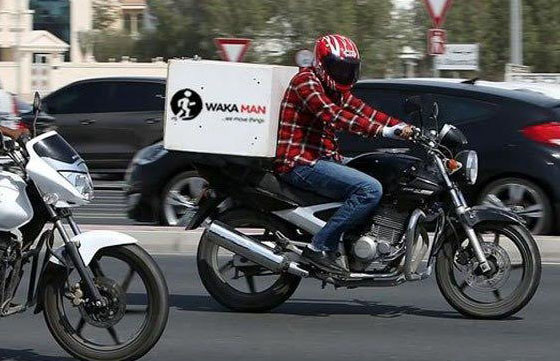
With the challenges occasioned by technology and other unexpected occurrences such as the outbreak of COVID-19 pandemic that disrupted economic activities for most parts of 2020, businesses – small, medium and large scale – have continued to appraise the way they run their affairs to remain afloat amid the vicissitudes of today’s world.
One of the noticeable adjustments that many businesses have made to their operations is a shift from wholly physical operations to a combination of both virtual and physical transactions. Today, many businesses transact heavily via social media platforms such as WhatsApp, Facebook, Instagram, X and other online channels.
This paradigm shift has extensively altered the business space in the country with many start-ups leveraging it to build their customer base. It has also spurred the growth of logistics services in the country, which entrepreneurs attest, enhances their businesses.
According to Jeffrin Wilkinson Kalu of Jeffy Homemade Cereals, who packages her products from her small office in Ikorodu, Lagos State, the social media has become a common marketplace for different goods and services. She noted that while social media platforms are used to advertise goods to end users, logistics companies convey the goods to buyers from one location to another.
She disclosed that logistics agents reduce the burden of distribution on the producers, thereby, giving them room to concentrate on the production of more goods to meet up with customers’ demands.
Kalu stated that sometimes, the logistics agents return to the producers with more orders from customers, or even a fresh order from a new client, adding that they intermittently play the role of salesmen and distributors.
She also said the services of logistics agents are cost effective and widens producers’ distribution network, noting that the customers most times bear the additional cost of distribution.
Kalu added that in a situation where a customer decides to pick the goods through his/her logistics agent, the customer enjoys some discount.
She said logistics agents have given her products an unimaginable mileage, as they have enabled her to reach areas she never thought she could get to.
On the possibility of logistics agents running away with customers’ items, Abimbola Cole of Monye Fashions and Jewelries said the likelihood is very remote, stressing that that is why producers do business with registered companies.
According to her, many registered logistics companies install tracking devices in their motorcycles or vehicles, which enables the management of the company to know where a rider or driver is at a particular time.
She noted that such devices are just one of the many ways firms put an eye on the items sent to customers. She also revealed that some of the applications enable the dispatch rider to do a telecast or film when the items are being delivered and the conditions in which they are delivered. Cole said this helps to prevent the items from being pilfered or handled in a wrong way.
She added that the use of logistics agents have drawn the customers of small and medium scale producers nearer to their clients and also made operating from remote places worthwhile.
“The cost of getting these services is relatively low, if compared to the cost producers will incur acquiring delivery motorcycles or hiring drivers among other logistic hands to do the delivery, aside from taking care of the wear and tear. All this will run into several millions of naira, which impacts pricing and marketability,” she added.
The fashion designer disclosed that logistics agents sometimes provide services such as giving producers feedback on how customers’ feel about their products, noting that such feedback enables the producer to know if a particular client is satisfied or not.
Harping on the importance of logistics services to small and medium scale producers and e-commerce, the fashion designer said they have contributed to the increase in demand of her products and has also enabled her to get more hands and make more dresses readily available.
She revealed that she most times get orders virtually from people she had never met before.
For the dressmaker, logistics companies are like bridges between small and medium scale producers and the end users of their products.
“These courier/logistics firms pick orders from producers and deliver them to areas or regions beyond the imagination of the producers. What this simply means is that, I stay at Ikeja, but surprisingly I have a customer that stays at Lekki, Epe or Sagamu in Ogun State or even Sango. There is no way I would have been able to reach these customers had the courier/logistics services not been in business. In fact, their services have reduced the number of staff, welfare packages and other fringe benefits I would have paid to my staff to distribute my products on my own,” she said.
According to her, clients are like kings, especially when they pay for their consignments. “They do not want to entertain any story of delays or failure to supply. As a result of this, it behooves producers to supply within the agreed time and the only fast and reliable means to do this is to use logistics firms,” she added.
Cole, however, noted that given the nature of the country’s road network, producers should work with logistics firms that have insurance cover in case of any accident.
“They should also work with those whose charges are affordable to avoid increasing overhead cost and pricing; those whose riders are conversant with the city or state and their various traffic laws and by-laws for easy reach and to avoid unnecessary harassment by different law enforcement officers; and those that could do next day delivery, in case of any unforeseen circumstances that would make the rider/vehicle unable to deliver on the same day as expected and also not able to return to the producer, but to continue the next day,” she advised.
For Rufus Zalmon, who deals in ladies’ shoes, logistics firms have eased his fears of being on the road to Aba and Jos most times to buy his wares.
Zalmon explained that he sends the measurements he needs to the shoe factory at Aba and the company would send his consignments to him through logistics companies, saying this has removed the fear of being kidnapped or staying long hours in traffic in the name of following his consignment from the place of purchase to the place of sales.
“I sometimes bring 25,000 pairs of different colours and sizes of ladies’ and children’s shoes. All I do is to go to Aba and pick all I want from different factories and arrange with a logistics company to bring my consignment home. It saves me from police harassment and the fear of vehicle breakdown if I use public transport. Although the cost may be higher, it surely gives me peace of mind that my wares will get me and if there is any damage the company will pay.
“I have so much developed trust with the factories that I just phone and they will put my wares together and send them to me. Logistics companies are aids to trade; we need them to move our large consignment and they don’t fail even with our dreadful roads,” he said.
Highlighting how logistics companies have contributed to the growth of his business, Charles Emenike of Deep Learners’ Publishers, Lagos, disclosed that without them, his books would not have reached other states in the country and Abidjan, Cote d’Ivoire, where they are currently in use.
The publisher noted that he waybills the books to the different schools in the country and Abidjan through logistics companies, adding that he only monitors the consignment through WhatsApp. He stressed that the logistics companies have not only helped him and other small and medium industries to remain in business, but also served as a catalyst for them to grow.
“The new normal is all about technology and synergy; one needs to identify and then improve on whatever he or she is doing.
“Before now I did follow my consignments around, taking them to places of need and also facing life threatening situations; at times attacked by highwaymen. Now, those things are in the past; I package my goods and deliver through courier. If the goods are too much for a courier to handle, I use logistics companies. They are prompt and know how to maneuver their ways through all the man-made obstacles on the road, be it at night or in the day. And since using them, they have repositioned my business, brought more profit and created new frontiers and mileage. They have also given me time to concentrate on writing and administration,” he said.
Also speaking on the importance of logistics companies, a Kano-based auto spare parts dealer, Hilary Nwaeke, said he comes to Ladipo Market in Lagos to buy his second-hand engines and other auto spare parts, which are delivered to him in Kano.
According to him, he only deposits money and the traders would send the engines to him. He wondered how he would have been able to take those engines to Kano without logistics companies, noting that their services are essential for any growing business, especially now that many business people fear travelling by road.
For Etim Okon, who deals on crayfish and other dried seafood from Oron in Cross River State and its environs, the logistics companies have saved a lot of small and medium business owners from engaging in unnecessary journeys.
He noted that he only travels thrice a year to arrange for how his consignments would be brought to his shop at Ijora, adding that the logistics outfits have made trade easier.
Okon said his agent only informs his logistics company when the dried fish and crayfish are ready for shipment, stressing that they do deliver. He noted that aside from delivering goods, these companies give classified information at times about the road, security and even changes in price.
He said: “One thing about them is safety; these companies will not knowingly damage your products. When it is raining or there is an upheaval in town, they will keep your products in their warehouses for safety or leave the vehicle at a safe location. Many business people have been forced to close shops because rain spoiled their products on transit or some hoodlums destroyed them during crisis. So, for me, they have enabled me to maximise profits, minimise losses and gain new customers.”
For Madam Lola Adeniyi whose company, Greenland Integrated Agric Project Ltd, deals on dried fish, crayfish and other food items, the exigencies of the times demand that businesses, especially the small and medium scale outfits, should be up and doing, adding that since most of them cannot afford to have delivery outlets, they depend on logistics firms for their deliveries. She observed that as competition gets stiffer by the day, producers should be dynamic to meet the demands of customers or else they will lose a large share of their customers.
According to her, if a good product does not get to the market, it is as good as not produced. “So, having an efficient and effective distribution network is very crucial as it will check losses or clients shifting to available alternatives. This is where logistics firms come in,” she said.
She, however, urged producers to put safety measures in place to enable customers to tell when their items have been tampered with. According to Adeniyi, once a producer begins to doubt a particular logistics firm, it will be nice to change such company.
A worker with Okiki Courier Services, Ikeja, who identified himself simply as Tolu, disclosed that his company has launched a customised App to monitor goods delivery, adding that it is only through the use of such apps that effective delivery can be guaranteed and enable small-scale business owners to have peace of mind.











